SDG 4 Quality Education
By Joel Meyers, Director of Communications, GlobalWA
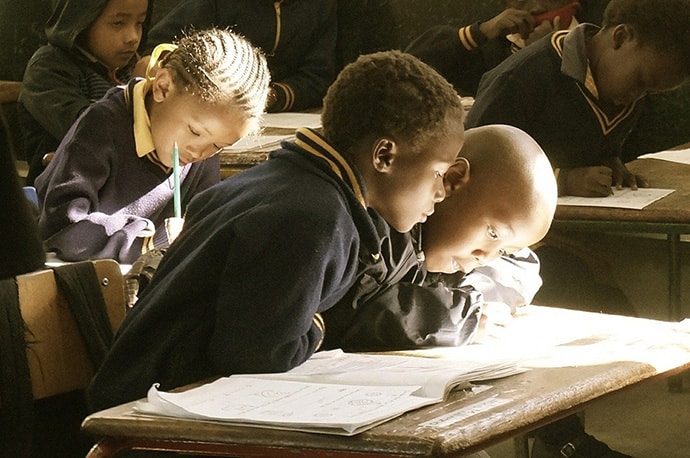
Sustainable Development Goal 4 states: Ensure inclusive and equitable quality education and promote lifelong learning opportunities for all.
This can be at times a seemingly insurmountable task when communities need workers in the field, have gender discrimination keeping girls out of school, lack basic teaching and learning materials, or simply do not have a physical space where students and teachers can congregate for the learning experience. These challenges are global and unfortunately too common in low- and middle-income countries, especially in rural areas.
Education is a primary focus for many of our members who recognize the importance of education for breaking the cycle of poverty and creating systemic, positive change. Read about our members’ work below, the programs, approaches, and innovations that are giving hope and empowering communities to evolve and thrive. Sometimes, one student at a time.
Sound Infrastructure and Schools
One of the projects of the Ashesi University Foundation works to build infrastructure capacities for education across countries in Africa by building academic and residential buildings to house students and enable research. Their three capital projects, slated for development between 2023 and 2028, aim to double the enrolment rates of local students and open new avenues for graduate and post-graduate studies.
With up to 1500 students currently enrolled in Ashesi programs across 34 countries, 93% of graduates find careers within 6 months of completion, and 71% accept placement offers.

Since 2018, A Child’s Notebook has partnered with local communities to improve education for over 3,500 students in Laos. They recognize lack of access to education worsens already staggering income gaps, and illiteracy increases the number of people who live in poverty. By providing proper infrastructure, such as schools, libraries, dormitories, and latrines, A Child’s Notebook has been able to provide indelible change to rural Laos, nurturing foundations of education to help communities break the cycle of poverty.
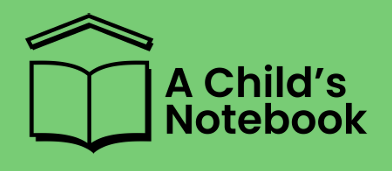
The Mona Foundation sees education as a pathway to empowerment, gender equality, and economic development. Since their founding in 1999, Mona Foundation has supported 4,263,012 students (more than 50% girls) to access quality education through 41 partner organizations in 23 countries.
Partnerships are key, and Mona seeks partnerships with grassroots organizations where Mona can help with infrastructure and scholarship, teacher training, and girl empowerment. One example is in Sierra Leone where they have partnered with Hope Academy for Girls. Hope Academy is the only Junior and Senior Secondary School for girls in the Western Area of Sierra Leone. The challenge was past events such as the civil war (1991-2002) had destroyed much of its infrastructure, and present events, such a COVID, have created overwhelming obstacles for access to education in Sierra Leone. Especially for girls in rural areas, access to education continued to be a challenge – while significant progress has been made over the last ten years in decreasing the gender gap in education, girls are still more likely to drop-out of school (particularly post-primary), particularly due to underachieved grades, financial constraints, abuse and/or exploitation.
Through Mona’s support, Hope Academy has a strong partner to help with operations, staff salaries, staff housing, and teacher training. By supporting Hope Academy, Mona is helping girls to reach their potential and overcome obstacles for succeeding in secondary school. Through these efforts, Mona Foundation is helping create economic stability, and empowering not only girls from a grassroots level, but also community and country.
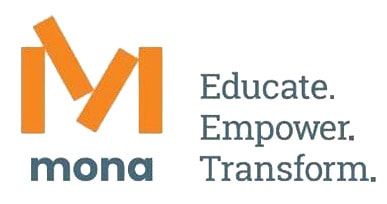
Sierra Leone is another country that was ravaged by war – in 2002, after 10 years of conflict, their civil war ended. Destruction and poverty were widespread. To help rebuild, Schools for Salone (Salone is another name for Sierra Leone) was formed in 2004 by Cindy Nofzinger, a Peace Corps volunteers who worked in Sierra Leone in the mid-1980s, and through a partnership with Program for Children there, built and opened their first school 2005.
Schools for Salone recognizes the fact that education equals opportunity. Yet, to provide education, villages need schools where teachers and students can congregate. Their philosophy is “one school, one teacher, one child at a time.” Through local partnerships, Schools for Salone have built 43 schools with a cumulative enrollment of 15,000 students, five libraries, have trained over 500 teachers, and have promoted education equity throughout. These efforts help break the cycle of poverty and lay the foundations for recovery of Sierra Leone.
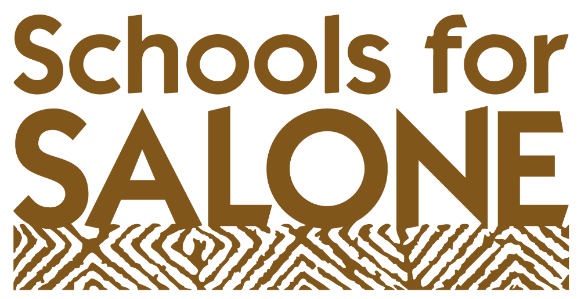
Rwanda Girls Initiative recognizes the power of educating girls will not only uplift their local communities, but the world in general. UNICEF reports that girls’ education improves health outcomes, saving millions of lives, and evidence shows that countries with less gender disparity in schools are more likely to have higher economic growth and stability. In a country where only 3% of girls pursue higher education, 97% of Rwanda Girls Initiative’s Gashora Girls Academy graduates attend universities around the world. Academy alumnae are studying at 221 universities in 31 countries.
Gashora Girls Academy of Science and Technology opened its doors in 2011 as an all-girls secondary boarding school. Students are selected based on academic potential and are provided with 100% financial aid for attendance. This model results in nurturing some of the best and brightest female minds in Rwanda, providing hope, empowerment, thus helping break the cycle of poverty and creating positive systemic change.
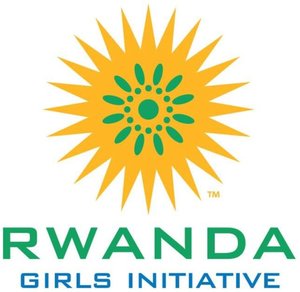
Innovative Solutions
WorldReader’s BookSmart app is an accessible tool that promotes literacy across the world, including India, the US, Kenya, Mexico and Peru. With intuitive challenges and guided literacy development, BookSmart leverages its vast library through multiple languages to bypass accessibility barriers and engage with students.
Through their various reading initiatives, WorldReader has increased not only reading itself, but the joy of stories and community sharing. For example, in Sierra Leone, WorldReader engaged 12 schools and 390 pupils with a holistic reading experience starting on shared tablets for offline student reading and accompanied by weekly book engagement activities sent by reading club facilitators through WhatsApp communities. This “Read with Us” pilot, which paves the way for future programs, resulted in a much more enjoyable experience than solitary reading and increased the average reading time of the pupils to 53+ minutes per day.
![]()
Bringing classrooms to the students may be unconventional, but that’s exactly what Sukarya’s Education on Wheels (EOW) program sets out to do in India. Buses equipped with computers and classroom essentials are brought to nearly 150 children every day, moving through a total of 6 slums across Delhi and Gurugram. The program brings quality education to children in impoverished regions who may not be able to travel to schools, providing literacy training, life skills and guidance on health and wellness.
Sukarya’s mobile classrooms are one of many projects implemented by GWA members to provide quality education, bringing people across the world closer to the targets of SDG 4. From basic literacy to health, hygiene and wellness coaching, grounded efforts to make education feasible and accessible for all have been made by NGOs in a broad range of capacities.
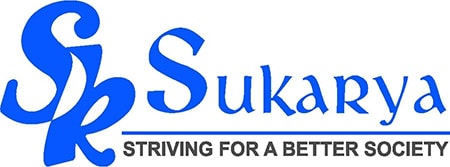
After the Taliban restricted female education and more recently banned formal education for girls above 6th grade in Afghanistan, Sahar Education had to take a very different tact to their education programs.
Before the second protracted insurgency and subsequent Taliban takeover in 2021, Afghanistan’s schools were open to girls, though because of traditional patriarchal discrimination, not in equal numbers as boys, and that is where Sahar stepped in to help. Their efforts began in 2001 and for the next two decades helped create educational and economic opportunities by building schools, computer centers, and managed teaching training programs. They created many innovative initiatives including Men as Partners in Change where they taught men about gender equality and how women can contribute to a healthy and prospering society.
Now, through grassroots partners in Afghanistan (who must remain anonymous for security reasons), Sahar has continued to create opportunity for girls and women despite the Taliban oppression. Underground TechSheroes is a clandestine program that teaches women and girls computer skills, such as MS Office, IT, and coding. Through these modern essential skills, they now have opportunities to contribute to business and the digital economy to help uplift their rural communities. Men as Partners in Change continues as well, to ally with men and create communities that recognize the value of both genders. This program teaches boys and men the value of women’s roles, about gender equality, and how working as equal partners in the home and in community will create peaceful and positive outcomes.

Holistic Approaches
Opportunity International roots their EduFinance program and projects through the statement: “To end extreme poverty tomorrow, we must educate children today.” They embrace the understanding that giving children access to good education reduces poverty and inequality, increases life expectancy, and gives women and girls more decision-making power.
To achieve these goals, Opportunity International, through their EduFinance interventions provide numerous programs that provide teacher support and training, financial support for educational systems as well as parents (so children are not pulled out of school to help work), quality assessments and paths for improvement, and digital training tools and in-person training for teachers and school staff.
Their focus on financial support involves working with local financial institutions to increase business acumen and service delivery, for example through partnering on market research and the design of financial products that meet the needs of the parents and school owners. EduFinance implementors also help train staff at the financial institutions to ensure success of education lending portfolios, including portfolio analysis and credit assessments using in-house developed digital tools.
As of the end of 2023, through the EduFinance program, $202.8 million total capital has been released, 7,056 schools have been financed, and over 13 million children have been reached cumulatively.
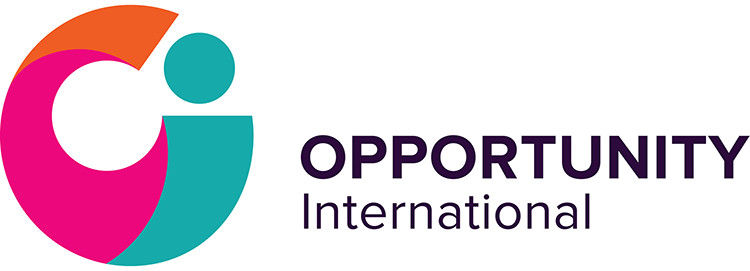
Though Gargaar Relief Development Organization (GREDO) focuses on many aspects of emergency and direct humanitarian responses, they recognize investing in development and resilience programs, such as education, is paramount for the health of the Somali communities they serve, and Somalia as a whole. Their holistic approach involves ensuring a robust infrastructure, providing proper staffing, and developing supportive partnerships.
To accommodate growing enrollment numbers, GREDO has been constructing many Temporary Learning Spaces, recruiting dedicated teachers, and providing teaching and learning materials. Teachers are incentivized as high-quality teaching is key to a successful program.
GREDO also works with the communities directly and empowers them by ensuring their voices are heard regarding needs and challenges, which includes “needs mapping” for children who need additional support, and providing varieties of educational pathways. Tangentially, GREDO also provides protection services for children, ensuring safety and support, as well as case management and referral mechanisms.
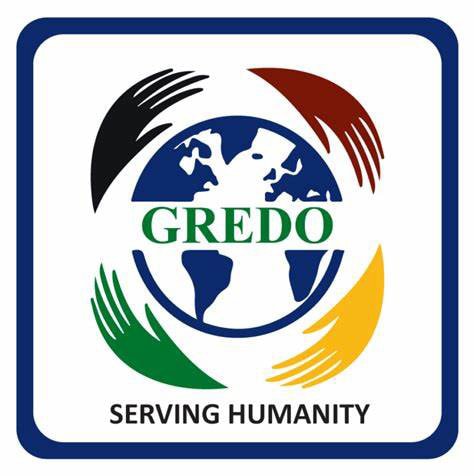
Global Communities also understands the importance of helping communities from the grassroots level by focusing on youth education and development. They follow a proven methodology called Positive Youth Development (PYD) developed through a collaboration of 22 federal departments and agencies that support youth, which in essence can be defined as Positive Experiences + Positive Relationships + Positive Environments = Positive Youth Development.
Using the PYD methodology, Global Communities has partnered with youth in more than 15 countries on projects that offer opportunities for employment, better health, obtaining an education, reducing conflict and gaining leadership skills. Youth are trained to participate in community and country through critical thinking, gender education and combating gender-based discrimination, leadership training, safe navigation and discernment of misinformation of digital media, as well as physical and emotional health.
By focusing on these life skills, Global Communities is helping communities be productive and healthier while providing tools for future leaders and changemakers.

Education is a primary driver of progress across all 17 SDGs and is the bedrock of just, inclusive and peaceful societies. GlobalWA members working across the globe in low- to middle-income countries are providing exemplary education programs, tools, innovations, aid, and most of all hope and empowerment to these communities. They are helping break the cycle of poverty, helping countries recover from disaster, teaching modern tools and technology, and through doing so are helping create the next generation of powerful minds to help their countries thrive.
Upon invitation, the following GlobalWA members have issued these statements about their work on Quality Education in the communities where they work.
A Child’s Notebook (ACN) partners with local communities, investing in the lives of children in Southeast Asia to ensure all children have access to a quality education. Since 2018 ACN has been working specifically in rural Laos. ACN has three core programs.
Scholarships: removing financial barriers is an important way to ensure more children attend school. ACN provides scholarships to support a student’s entire school journey. Infrastructure: in deep collaboration with each community, ACN provides the financial resources to build physically safe schools, dormitories, and proper latrine facilities. Afterschool Programs: Working alongside teachers, ACN supports enrichment activities for elementary students.
Underpinning all of their work is the desire to open more doors for girls, thus a focus on Girls’ Education, ensuring they have access, financial means, and support from their family and communities to attend school is central to ACN’s strategy.
A Child’s Notebook’s approach is grounded in deep partnership, active listening, and local ownership. Together with parents, teachers, and village leadership, ACN determines what needs and priorities will help more children attend and complete school. This community-centric approach ensures sustainability and prioritizes local expertise in achieving quality education. ACN also has a commitment to sourcing materials locally not only to support the local economy but also to ensure that their resources benefit the people of Laos.
In 2022, ACN began supporting local community-based organizations on the Thai-Myanmar border, where thousands of Burmese have been displaced by political unrest. Migrant families move often to find safety. Their children lack official documents and struggle with a new language. ACN supports community-led initiatives for these children, helping with official IDs, language classes, and other educational support.
For over 20 years, Global Communities has been implementing the McGovern-Dole International Food for Education and Child Nutrition (MGD) programs across Africa and South and Central America, including Guatemala, Madagascar and Tanzania. Our programs, funded by the United States Department of Agriculture (USDA), provide daily nutritious meals to school-age children, which are critical for their physical growth and brain development. Well-nourished children are more likely to have better cognitive abilities, higher concentration levels and stronger academic performance. Our MGD programs champion an integrated and multisectoral approach to improve students’ nutritional and learning outcomes. In addition to delivering food aid, we promote literacy and early child development, improve school infrastructure and curriculums, and strengthen the capacity of local communities to gradually transition to locally owned school meal programs. Our interventions also encourage school attendance. For many families, the assurance that their child will be fed at school provides a strong incentive to prioritize education over other responsibilities. In Madagascar, for example, improvements generated by our Mianatra (“Learn” in Malagasy) program have led to a steady increase in the average attendance rate of students, which now ranges daily from 88% – 94%, compared to less than 60% at the start of the project.
Gargaar Relief Development Organization (GREDO)
GREDO education program offers education services to the most vulnerable out-of-school children, providing them with vital educational opportunities through various different education projects and interventions. In the past year alone, GREDO has successfully reached over 31,000 learners, showcasing its commitment to transforming lives through education. The education program employs three distinct pathways to cater to the diverse needs of these children: Formal Education, Accelerated Basic Education (ABE), and Non-Formal Education (NFE).
Formal Education is tailored for children who are able to participate in traditional school settings, ensuring they receive a quality education that aligns with national standards. ABE focuses on providing essential literacy and numeracy skills to children who have missed out on formal schooling, offering a more flexible approach that respects the varied circumstances of these learners. Meanwhile, NFE addresses the needs of older youth and adults who seek to gain knowledge and skills outside the conventional education system, empowering them with not only basic literacy and numeracy but imparts skills to improve their livelihoods and contribute positively to their communities.
At the heart of GREDO’s education program is a strong emphasis on community participation and ownership. By involving local stakeholders—parents, community leaders, and school communities, GREDO fosters a sense of belonging and responsibility towards educational outcomes. This collaborative approach not only enhances the sustainability of the program but also ensures that the interventions are community owned and relevant to the context.
At Mission Africa, our education focus area aims to break the cycle of generational poverty through the power of education.
Locally, our annual Back-to-School event provides hundreds of students in South King County and the Seattle 211 system with backpacks filled with supplies, to start the new school year ready to learn. Since 2022, we have offered free computer classes, helping hundreds of immigrants enhance their computer skills, leading to job promotions, increased digital proficiency, and the ability to navigate the digital world confidently. Additionally, we provide leadership trainings to African Community Leaders across the Puget Sound, multiple times a year, inspiring the formation of new nonprofits, small minority businesses and, positive economic growth for immigrant families.
Globally since 2008, our education initiatives in Nigeria, offers a six-year high school scholarship program for 50 students’ cohort at a time. Today, we have 150 graduates, 100% graduation rate, 65% continuing to post-secondary education and the fourth cohort of 50 students begins in September 2024.
Our programs are rooted in our vision to see the collective thriving immigrants in Washington State and beyond.
For a visual impact of our work, visit: https://www.flickr.com/photos/missionafrica/albums/,
Read more about us at http://www.missionafrica.us/ourhistory or
Catch us in action: http://www.missionafrica.us/newsletters.
Mona Foundation envisions a world where every child on the planet has access to education because education changes everything. It enables. It empowers. It gives voice. It gives choice. It protects the environment. It promotes peace.
For the past 25 years, with love and compassion in our hearts for every child, we have worked to make this vision a reality. Galvanized by the urgent challenges and opportunities existing in global education, Mona Foundation has pursued its mission by supporting grassroots organizations that educate children, empower women and girls, and foster ethics and service to develop change agents who uplift themselves, their families, and their communities.
Our work is rooted in our core belief in the oneness of humanity and our conviction that every person, irrespective of geography and economic standing, has the right to self-determination and the responsibility to build their capacity and fully participate in the social and economic development of their communities.
Since 1999, Mona Foundation has provided access to education for over 4.2 million students. This work is driving progress on gender equality, breaking the cycle of poverty, and contributing to sustainable change in the overall well-being of communities in dozens of countries across four continents.
At Rwanda Girls Initiative, they know that investing in girls’ education, especially secondary education, is one of the most powerful levers one can pull to spark systemic change. When girls receive an education, they are more likely to lead healthy, productive lives, earn higher wages, and participate in their community. At Rwanda Girls Initiative, they know it is important to get girls in the classroom, but they want to get them into the boardroom, the operating room, the laboratory, and the capital.
As an all-girls boarding school in Rwanda, they removed the most significant barriers to education for their students. Their school is one of the most socio-economically diverse schools in Africa, with 100% of their students receiving financial aid. Students are the most engaged and intellectually curious young women in Rwanda, and they foster a culture that encourages students to boldly seek answers to some of the world’s biggest challenges and spark positive change in their communities. To date, they have graduated 881 young women now studying in universities around the world. When Rwanda’s best and brightest young women are provided an environment of academic excellence and equipped to lead with empathy and understanding, the world’s future is transformed.
Headquartered in Seattle, WA, Sahar Education’s achievements in Afghanistan’s educational sector are notable. Sahar has illuminated the lives of more than 250,000 students, collaborating with local and international entities to enhance its capabilities in providing aid, expertise, and sustainable solutions in development, legal, and human rights issues.
The Taliban’s resurgence in 2021 prompted Sahar to adapt its strategies, focusing on clandestine educational support through underground schools, literacy and sewing programs, and empowerment/advocacy initiatives tailored for the Kabul and Mazar-i-Sharif communities. This strategic pivot reflects Sahar’s commitment to education and empowerment despite adversity.
Since September 2021, the return to school for all Afghan girls over the age of 12 has been indefinitely postponed, leaving 1.1 million girls and young women without access to formal education.
In the face of these challenges, Sahar Education remains steadfast in its mission, guided by the resilience and aspirations of its participants. As a result, Sahar Education was recently named Best Women & Girls Education NPO 2024 – Afghanistan and has been named a finalist in the Quality Education for All category of the .ORG Impact Awards.
By providing education, advocacy, and empowerment, SAHAR lays the groundwork for more equitable and prosperous communities in Afghanistan, embodying a beacon of hope and a catalyst for change amidst adversity.
Schools for Salone (SfS)’s mission is to advance education in Sierra Leone through local partnerships. One of our key program pillars is to advance quality education in our schools and communities by investing in teachers, focusing on foundational learning skills and literacy amongst students and equipping schools with the resources they need for students to thrive.
The literacy rate in rural Sierra Leone is only 43%. This is due to limited access to books, widespread illiteracy amongst parents and insufficient preschool education. Additionally, most teachers lack skills and knowledge to teach reading skills. This means that many students in primary school struggle to master basic foundational learning skills like literacy and numeracy.
Schools for Salone partners with a Sierra Leonean non-profit organization called The Learning Foundation to enhance literacy and learning engagement through teacher training and reading clubs. In 2023, The Learning Foundation in partnership with Schools for Salone, trained 135 teachers in 22 primary schools in literacy strategies and supported over 427 students and 19 teachers in reading clubs across Sierra Leone. Last academic year, exam pass rates increased by 13% among students in our Schools for Salone primary schools.
Equitable access to education is central to Stronger Stories. Its mission is to democratize storytelling power and create stronger storytellers, so good ideas get heard. Stronger Stories supports access to quality education in two ways. First, as a registered B Corp, it invests half its profits into Lean Story School, a free online learning platform with bite-sized lessons and inspirational case studies that build storytelling skills and confidence. As a result of Stronger Stories’ educational programs, 5792 people (and counting) have become stronger storytellers. Second, Stronger Stories’ education practice has been central to the consultancy since it was founded in 2018. One long-standing client is WorldSkills, a global skills movement that sets the international standards for excellence in Technical and Vocational Education and Training (TVET). Its biannual competition showcases the world’s most skilled young people and demonstrates to governments and industries why skills are fundamental to economic security and prosperity. Stronger Stories helps measure and articulate the organization’s impact, and finds and shares stories of change from across its 88 member countries. Stronger Stories will be at the 47th WorldSkills Competition in Lyon, France this September where 1,400 Champions will compete for gold, silver and bronze medals in 59 skill areas. Alongside it, thought leaders from around the world will convene at the WorldSkills Conference 2024 with an aim to elevate TVET to the top of the global agenda.
Wheeling Towards Hope: Revolutionizing Education for Slum Children with Sukarya’s Mobile Classrooms
In the sprawling slums on the edges of India’s bustling cities, millions of children are trapped in a relentless cycle of poverty. For many first-generation learners, the dream of education remains distant. Amidst these challenges, Sukarya’s “Education on Wheels” (EOW) program emerges as a source of hope, showcasing the transformative power of education for marginalized communities.
Sukarya’s “Education on Wheels” program directly addresses the critical issue of illiteracy in India’s slums by providing free education to children aged 6 to 14. These mobile classrooms are equipped with learning materials, technology, and dedicated educators. The program focuses on basic literacy, numeracy, and essential life skills, ensuring that at least 50% of enrolled students are girls. EOW also emphasizes community engagement through monthly parent-teacher meetings and community gatherings.
Since its inception in 2014, the program has reached 3,000 children, significantly improving their academic performance and instilling a sense of self-worth and confidence. Sukarya’s efforts underscore the importance of accessible education in breaking the cycle of poverty and fostering a culture of learning and aspiration within communities. This functional literacy program for slum children has truly transformed countless lives.
Yemen Relief and Reconstruction Foundation
The Yemen Relief and Reconstruction Foundation (YRRF) is committed to addressing the multifaceted humanitarian crisis in Yemen, including the critical need for education among the country’s children. Since the conflict began in 2015, Yemen’s education system has been severely disrupted, with millions of children out of school and thousands of schools destroyed.
YRRF’s initiatives are in line with the United Nations Sustainable Development Goal 4 (SDG4), which aims to ensure quality education for all. In 2023, YRRF distributed over 4,000 school bags and supplies to students who could not afford to go to school, ensuring their attendance. YRRF is also sponsoring over 350 orphans, providing them with essential support such as shelter, food, medical care, and educational opportunities. This program not only helps children return to school but also alleviates the financial burden on families and fosters a stable environment conducive to learning.
The prolonged conflict has impacted nearly all 10.6 million school-age children in Yemen, many of whom are experiencing disruptions to their education. YRRF’s efforts, such as distributing school supplies, repairing schools, and supporting both special needs and gifted students, are designed to address these challenges and help children continue their education, paving the way for a brighter future.
Your donations are crucial for sustaining and expanding our programs. Visit yemenfoundation.org to learn more about YRRF’s mission and how you can make a significant impact on the lives of Yemen’s children.